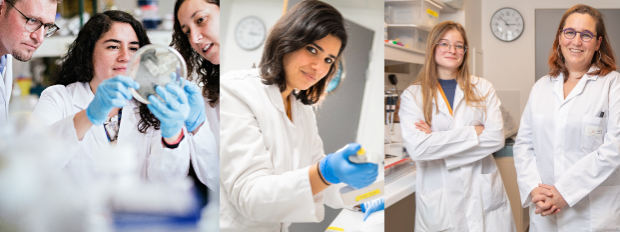L'Institut Curie lance son nouveau programme doctoral international en sciences de la vie intitulé "IC-PhD". Ce programme offre 5 bourses à partir de septembre 2024 avec une nouvelle procédure de sélection.
LA RECHERCHE À L'INSTITUT CURIE
Tout comme le traitement et la recherche, la formation et l'éducation font partie intégrante des missions sociales fondatrices de l'Institut Curie. Notre objectif est de préparer les futurs leaders. Ainsi, chaque année, le Centre de recherche de l'Institut Curie accueille des centaines de doctorants venus du monde entier.
Ils effectuent leurs recherches dans un environnement dynamique basé sur les approches pluridisciplinaires et l'excellence offertes par plus de 85 groupes de recherche comprenant les 13 unités mixtes de recherche de l'Institut Curie organisées en 6 thèmes de recherche et un département de recherche translationnelle :
APPEL À CANDIDATURES
L'appel à candidatures est désormais ouvert.
Vous trouverez ci-dessous la liste des projets de doctorat pour le programme IC-PhD 2024. Veuillez noter que tous les projets ne seront pas financés dans le cadre du programme. Une procédure de sélection aura lieu pour le financement.
Contactez le chef de l'équipe à laquelle vous souhaiteriez candidater.
|
Ultrastructural architecture of the intercellular bridge by cryo-electron microscopy
Thesis supervisor(s): Aurélie Bertin
Research group: Molecular Microscopy of Membranes (MMM)
Email contact of the supervisor: aurelie.bertin [at] curie.fr
|
Project 1 |
|
Characterization of DNA repair in mitosis, a path to identify new tumor vulnerability
Thesis supervisor(s): Raphael Ceccaldi
Research group: Alternative DNA repair mechanisms in human cancers
Email contact of the supervisor: Raphael.ceccaldi [at] curie.fr
|
Project 2 |
|
Electrohydraulic properties of cells and tissues
Thesis supervisor(s): Charlie Duclut & Thomas Risler
Research group: Physical Approach of Biological Problems
Email contact of the supervisor: charlie.duclut [at] curie.fr
|
Project 3 |
|
Genome plasticity from evolution to cancer: an inducible system to understand the genesis and stability of neocentromeres
Thesis supervisor(s): Daniele Fachinetti
Research group: Molecular Mechanisms of Chromosome Dynamics
Email contact of the supervisor: daniele.fachinetti [at] curie.fr |
Project 4 |
|
Coordinating lumen formation and cell fate specification in embryonic epithelial morphogenesis
Thesis supervisor(s): Silvia Fre & Maria Luisa Martin-Faraldo
Research group: Notch Signaling in Stem Cells and Tumors
Email contact of the supervisor: silvia.fre [at] curie.fr |
Project 5 |
|
A DNA/RNA crosstalk: The role of splicing in transcriptional regulation
Thesis supervisor(s): Reini Luco
Research group: Chromatin and RNA splicing
Email contact of the supervisor: reini.luco [at] curie.fr |
Project 6 |
|
Mechanisms controlling stemness, epithelium-to-mesenchyme transition and genomic stability in neural crest cell development and melanoma
Thesis supervisor(s): Anne-Hélène Monsoro-Burq & Boris Bardot
Research group: Signaling and Neural Crest Development
Email contact of the supervisors: anne-helene.monsoro-burq [at] curie.fr; boris.bardot [at] curie.fr
|
Project 7 |
|
Exploring functional interactome of Androgen Receptor and RNA in the early onset of the castration-resistant prostate cancer
Thesis supervisor(s): Antonin Morillon & Marina Pinskaya
Research group: Non-coding RNA, Epigenetics, and Genomes Fluidity
Email contact of the supervisors: antonin.morillon [at] curie.fr; marina.pinskaya [at] curie.fr |
Project 8 |
|
Role of architectural proteins in the spatial organization of the Bombyx mori genome and Mitotic chromosome architecture in holocentric insects
Thesis supervisor(s): Héloïse Muller
Research group: Evolution of centromeres and chromosome segregation
Email contact of the supervisor: heloise.muller [at] curie.fr |
Project 9 |
|
Investigating innovative dose delivery methods to optimize the effectiveness of novel radiotherapy techniques
Thesis supervisor(s): Yolanda Prezado & Jason Parsons
Research group: New Approaches in RAdiotherapy (NARA)
Email contact of the supervisor: Yolanda.prezado [at] curie.fr |
Project 10 |
|
Diffusion of active transporters in bio membranes
Thesis supervisor(s): Raju Regmi & Patricia Bassereau
Research group: Membranes and Cellular Functions
Email contact of the supervisors: raju.regmi [at] curie.fr, patricia.bassereau [at] curie.fr |
Project 11 |
|
Characterization of alternative splicing programs associated with developmental origins of medulloblastoma
Thesis supervisor(s): Olivier Saulnier & Olivier Ayrault
Research group: Genomics and Development of Childhood Cancers
Email contact of the supervisor: olivier.saulnier [at] curie.fr |
Project 12 |
|
Active sorting of cancer cells and fibroblasts
Thesis supervisor(s): Pascal Silberzan
Research group: Biology-inspired Physics at MesoScales
Email contact of the supervisor: pascal.silberzan [at] curie.fr |
Project 13 |
|
Comparative Study of Spindle Assembly for Cancer Therapy
Thesis supervisor(s): Phong Tran
Research group: Cytoskeletal Architecture and Cell Morphogenesis
Email contact of the supervisor: phong.tran [at] curie.fr |
Project 14 |
|
Unravelling RNA G4 functions in alternative splicing events: underlying the role of G4 ligand stabilization
Thesis supervisor(s): Daniela Verga & Jean-Louis Mergny
Research group: Targeting of Nucleic Acids and Photolabelling Approaches
Email contact of the supervisor: daniela.verga [at] curie.fr |
Project 15 |
|
The molecular machinery of galectin-driven endocytosis
Thesis supervisor(s): Christian Wunder & Ludger Johannes
Research group: Endocytic Trafficking and Intracellular Delivery
Email contact of the supervisor: Ludger.Johannes [at] curie.fr |
Project 16 |
DATES IMPORTANTES
- Décembre 2023 : ouverture de l'appel à candidatures
- Date limite pour envoyer votre candidature au(x) PI(s) : 31 mars 2024
Pour postuler au premier appel du programme de doctorat international, veuillez suivre les étapes :
ÉTAPE 1
>> Vérifier les critères d'éligibilité
ÉTAPE 2
>> Rassembler les documents nécessaires
ÉTAPE 3
>> Envoyez votre candidature au chef de l'équipe de recherche à laquelle vous postulez.
Contrat de doctorat et formation
>> Consultez toutes les informations sur le contrat de doctorat et la formation
Renseignements : ic.phd [at] curie.fr
Nos précédents programmes internationaux de doctorat
>> EuReCa
>> IC-3i

